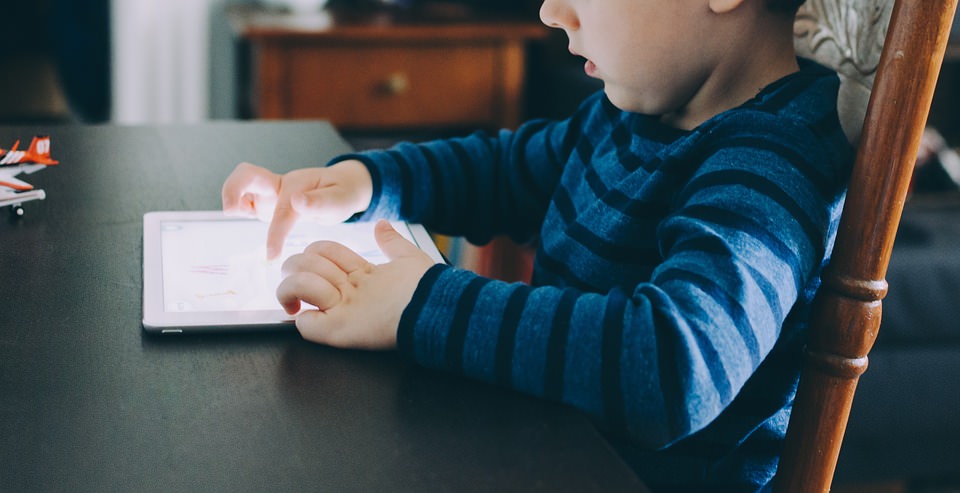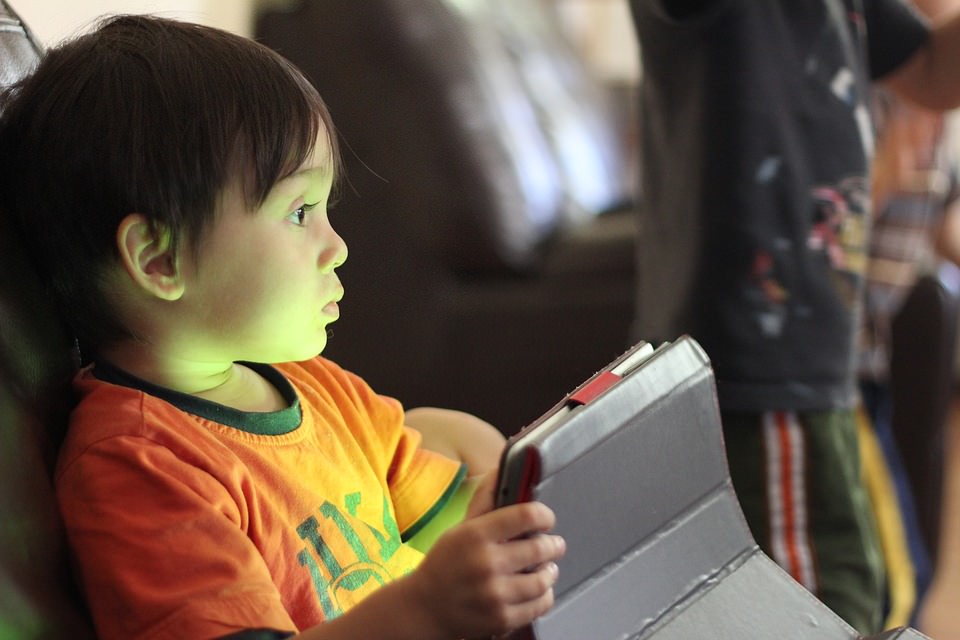Ten years ago, Psychologist Sue Palmer had predicted the ill effects of social media on masses a decade ago. Now she sees a worrying new danger that need to be controlled– It is about our children.
After seeing the toddler pointing to sweets at checkout her mother said: ‘No, they’re bad for your teeth.’ So the little princess-like-daughter of hers did what we observe small children often doing- threw a tantrum.

What followed next horrified the psychologist. Her mother being embarrassed handed her daughter the iPad that was in the bag and the peace was restored.
What really moved miss Palmer to say. She shares an incident happened three years ago.
“This incident, which happened three years ago, was the first time I saw a tablet computer used as a pacifier. It certainly wasn’t the last. Since then, I’ve seen many tiny children barely able to toddle yet expertly swiping an iPad – not to mention countless teenagers, smartphone in hand, lost to the real world as they tap out texts.”

She had written a book ten years ago about the bad impact of screen-addiction on young people’s minds and health. She was the first among many think-tanks who realized the dangers. She says,
“It’s ten years since the publication of my book, Toxic Childhood, which warned of the dangers of too much screen-time on young people’s physical and mental health. My fears have been realised. Though I was one of the first to foresee how insidiously technology would penetrate youngsters’ lives, even I’ve been stunned at how quickly even the tiniest have become slaves to screens – and how utterly older ones are defined by their virtual personas.”

She says the fast-paced tech orientation is quickly adopted by our children. The parents are finding it equally challenging to curb it.
“…Because technology moves so fast, and children have embraced it so quickly, it’s been difficult for parents to control it. And when it comes to spending a childhood in front of a screen, this generation are like lab rats. The long-term impact is not known.”
It is also a recorded fact that teachers had been warning the parents even before 2010 when the iPads hit the stores first time, 80 percent of the children arrive at school with lowest co-ordination mainly because of sedentary lifestyle.
She, along with the colleagues who research in the filed of child development have noticed a sudden four fold rise in the consumption of ‘Ritalin’ a drug to enhance attention and hyperactivity. The researchers say that, we’d collected a mass of research showing links between excessive screen-time and obesity, sleep disorders, aggressiveness, social alienation, depression and academic under-achievement.

It’s no or small wonder that a rise in iPads and smartphones has increased the furthermore deterioration in the physical and mental health of children at all stages.
A research conducted which shows that a 10 percent of children under the age of four always go to bed with their tablets, they keep playing until they fall asleep. An other study shows that a third of children under three own tablets and the toy shops sell ‘apptivity seats’ which can hold the tablets for children.
Only few know that Steve Jobs never let his children touch iPads. It is sad that he did not go public with the same agenda. If he had, many would have followed his advice.
It is sad to note that it is not the only worry that children keep stuck on the screen that affects their development but what screen displaces- They dont get a chance to learn and experience from the first hand knowledge. When they grow up find themselves perplexed to socialize with others.
She says,
“One of the most depressing examples of a totally screen-based childhood involved a ten-year-old in London. The overweight, pasty-faced little lad told me: ‘I sit in my room and I watch my telly and play on my computer . . . and if I get hungry I text down to my mum and she brings me up a pizza.’ The change in children’s play has happened in little more than a couple of decades. While many parents feel uneasy about all that screen-time, they haven’t tackled it as they’ve been so busy keeping up with changes in their own lives.”
And the truth is, it’s happening to children all over the world– so surely it can’t be that bad for all the children?
The truth is real play is a biological need that should be provided. One psychologist told me it was ‘as vital for healthy development as food or sleep’.
Why the basic revival of social control and imaginative development is need to be done at early age?
If the neural pathways that control social and imaginative responses aren’t developed in early childhood, it’s difficult to revive them later. A whole generation could grow up without the mental ability to create their own fun, devise their own games and enjoy real friendships – all because of endless screen-time.
It’s getting out and about – running, climbing, making dens and so on – that allows little children to gain physical skills. Playing ‘let’s pretend’ is a creative process requiring lots of personal input.
Why real play is essential to the proper development of a child?
Real play develops initiative, problem-solving skills and many other positive traits, such as a can-do attitude, perseverance and emotional resilience. It’s vital for social skills, too. By playing together, youngsters learn to get along with other people. They discover how others’ minds work, developing empathy. And, as real play is driven by an innate desire to understand how the world works, it provides the foundation for academic learning. Real play is evolution’s way of helping children develop minds of their own – curious, problem- solving, adaptable, human minds.
According to The American Academy of Paediatrics the children should not spend time onscreen under the age of two, a maximum two-hour time should be allowed to them there-after. It is just not the case of a link between attention disorders and screen-time but because the children would have time for other healthy activities.
It is a natural phenomenon that a newly born baby desired to seek the world on its own, they interact with the people around them passionately. It begins the real play. Thats why they seem to be happy when we play silly games with them like ‘Peekaboo’ etc or they are holding household objects. It helps them develop properly.
Contrarily, when they are getting instant rewards from the tech-devices they would not want to be part of any real play. The images on screens attract them with the same flair as our real world, they like controls and learn them quickly.
Neuroscientist Susan Greenfield says: ‘We cannot park our children in front of screens and expect them to develop a long attention span.’
She is quite worried about the bad impact of these devices on literacy. ‘Learning to read helps children learn to put ideas into logical order,’ she says. ‘On the other hand, staring at a screen puts their brains into suspended animation.’
Dr Aric Sigman, has gathered a huge amount of data on research that links children’s screen-time to ADHD, autism and emotional and behavioural disorders and screen based activities.
‘Unlike screen images, words don’t move, make noises, sing or dance. Ultimately, screen images render the printed word simply boring at a crucial phase when the child’s mind is developing,’ he says.
There is one more grave issue that arises and noticed among the children for too much screen-gazing –is that it doesn’t develop resilience.
Real activities always help children reach the solutions of knotty problems after some tough times. They come to know the ways to cope with challenges; they learn from their mistakes. All such activities help them develop self-confidence that makes them more emotionally resilient. Therefore, it is necessary that we should reduce the screen-time of our children as much as possible. Engage them in other activities than iPads, Tablets or any other gadget that fascinates them.
Source:







Comments 0